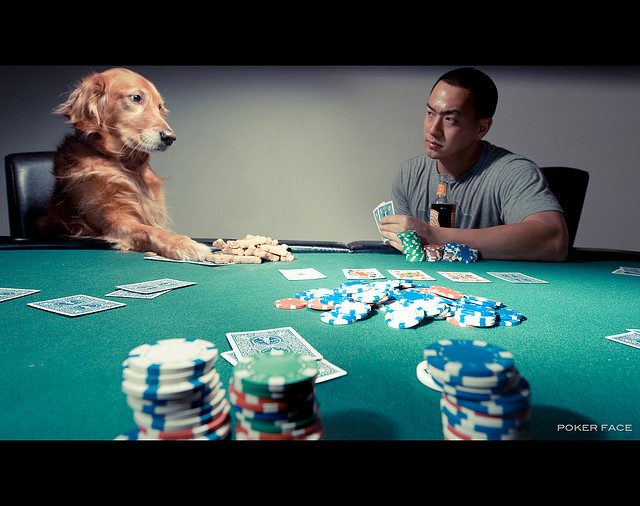The cards don’t matter. What matters is how you play them.
 What you think of yourself colors everything you do. When someone challenges your ideas, your response makes it clear how you see yourself. Regardless of your response, you tip your hand. Regardless of your response, everyone can see your cards.
What you think of yourself colors everything you do. When someone challenges your ideas, your response makes it clear how you see yourself. Regardless of your response, you tip your hand. Regardless of your response, everyone can see your cards.
When you have a terrible poker hand like, say, a king high, you can respond three ways. You can fold and let the challenger go unchallenged. You can check and kick the can down the road. Or you can bluff and go toe-to-toe with the challenger. With the fold you see things as they are and behave accordingly. The fold is an admission you have a lesser hand. And sometimes that’s difficult to do. The check says you don’t want others to know you have a terrible hand but you thing things will turn around. With the bluff you pretend things are different than they are and you pretend accordingly. You may fool the unseasoned player on your right, but make no mistake, the card shark on your left knows you’re bluffing. And deep down, you know too.
With a middle-of-the-road hand like the full house you have the same options. The fold is less likely because your hand is stronger. You fold only when you sense a strong challenge and the pot is large. No sense going head-to-head with a player with swagger when the stakes are high. There’s no harm in folding. The check says you’re not sure of yourself, or, you are and your hand is neither special nor terrible. The bluff is still risky but less so. If you think you can survive getting caught and are okay with the follow-on judgement, there’s a larger probability you’ll try.
With four aces you call the shots. The fold is reserved for those special situations where you want to preserve the status of players you care about. Or, when you have enough chips and you want others to get the glory. Either way it’s too little used. Few have the self-worth, generosity and thoughtfulness to play things that way. The check is equally generous. The check says you’re comfortable with your cards and how the hand is going. No need to flex your muscles. When you have the winning cards the bluff is counterproductive. Playing bigger than your hand pushes everyone away and they fold. You may with the pot, but next hand they’ll go after you. Embarrassing the other players is no way to play.
Really, though, your cards don’t matter. Regardless of your cards, don’t take a challenge personally. Regardless of your cards, respond like you hold all of them – all the aces, face cards, and all the wild cards.
It relatively easy to behave this way when the professional challenges your ideas because they don’t challenge you, they challenge your ideas. And you are not your ideas. Look deeply and honestly at the ideas and leave your self out of it. But it’s more difficult with the hack. Under the banner of challenging your ideas, the hack will try to challenge you. Here’s where you’ve got to hold onto a fundamental truth – no one can challenge you without your consent. Here’s where you’ve got to remember this truth applies to everyone – those with a four-of-a-kind, those with a full house, and those with a pair of twos. Here’s where you’ve got to remember that your cards don’t matter. The best way I know how to do that is to visualize your self as a screen door and let their hot air pass through you.
The challenges don’t matter and neither does the hand you were dealt. All that matters is your response. Respond with your heart’s best intentions and everyone will split the pot and they’ll want you to deal every hand.
Image credit – lawrence
 Mike Shipulski
Mike Shipulski